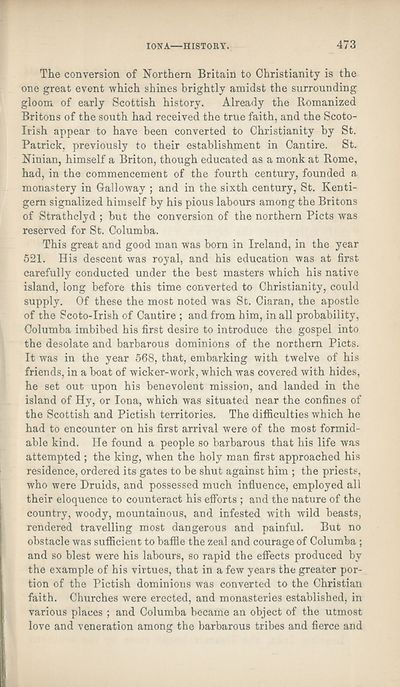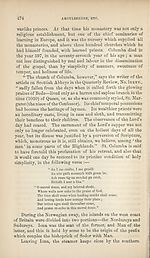Download files
Complete book:
Individual page:
Thumbnail gallery: Grid view | List view

L—HISTORY.
473
The conversion of Northern Britain to Christianity is the
one great event which shines brightly amidst the surrounding
gloom of early Scottish history. Already the Romanized
Britons of the south had received the true faith, and the Scoto-
Irish appear to have been converted to Christianity by St.
Patrick, previously to their establishment in Cantire. St.
Ninian, himself a Briton, though educated as a monk at Rome,
had, in the commencement of the fourth century, founded a
monastery in Galloway ; and in the sixth century, St. Kenti-
gem signalized himself by his pious labours among the Britons
of Strathclyd ; but the conversion of the northern Piets was
reserved for St. Columba.
This great and good man was born in Ireland, in the year
521. His descent was royal, and his education was at first
carefully conducted under the best masters which his native
island, long before this time converted to Christianity, could
supply. Of these the most noted was St. Ciaran, the apostle
of the Scoto-Irish of Cautire ; and from him, in all probability,
Columba imbibed his first desire to introduce the gospel into
the desolate and barbarous dominions of the northern Piets.
It was in the year 568, that, embarking with twelve of his
friends, in a boat of wicker-work, which was covered with hides,
he set out upon his benevolent mission, and landed in the
island of Hy, or Iona, which was situated near the confines of
the Scottish and Pictish territories. The difficulties which he
had to encounter on his first arrival were of the most formid¬
able kind. He found a people so barbarous that his life was
attempted ; the king, when the holy man first approached his
residence, ordered its gates to be shut against him ; the priests,
who were Druids, and possessed much influence, employed all
their eloquence to counteract his efforts ; and the nature of the
country, woody, mountainous, and infested with wild beasts,
rendered travelling most dangerous and painful. But no
obstacle was sufficient to baffle the zeal and courage of Columba;
and so blest were his labours, so rapid the effects produced by
the example of his virtues, that in a few years the greater por¬
tion of the Pictish dominions was converted to the Christian
faith. Churches were erected, and monasteries established, in
various places ; and Columba became an object of the utmost
love and veneration among the barbarous tribes and fierce and
473
The conversion of Northern Britain to Christianity is the
one great event which shines brightly amidst the surrounding
gloom of early Scottish history. Already the Romanized
Britons of the south had received the true faith, and the Scoto-
Irish appear to have been converted to Christianity by St.
Patrick, previously to their establishment in Cantire. St.
Ninian, himself a Briton, though educated as a monk at Rome,
had, in the commencement of the fourth century, founded a
monastery in Galloway ; and in the sixth century, St. Kenti-
gem signalized himself by his pious labours among the Britons
of Strathclyd ; but the conversion of the northern Piets was
reserved for St. Columba.
This great and good man was born in Ireland, in the year
521. His descent was royal, and his education was at first
carefully conducted under the best masters which his native
island, long before this time converted to Christianity, could
supply. Of these the most noted was St. Ciaran, the apostle
of the Scoto-Irish of Cautire ; and from him, in all probability,
Columba imbibed his first desire to introduce the gospel into
the desolate and barbarous dominions of the northern Piets.
It was in the year 568, that, embarking with twelve of his
friends, in a boat of wicker-work, which was covered with hides,
he set out upon his benevolent mission, and landed in the
island of Hy, or Iona, which was situated near the confines of
the Scottish and Pictish territories. The difficulties which he
had to encounter on his first arrival were of the most formid¬
able kind. He found a people so barbarous that his life was
attempted ; the king, when the holy man first approached his
residence, ordered its gates to be shut against him ; the priests,
who were Druids, and possessed much influence, employed all
their eloquence to counteract his efforts ; and the nature of the
country, woody, mountainous, and infested with wild beasts,
rendered travelling most dangerous and painful. But no
obstacle was sufficient to baffle the zeal and courage of Columba;
and so blest were his labours, so rapid the effects produced by
the example of his virtues, that in a few years the greater por¬
tion of the Pictish dominions was converted to the Christian
faith. Churches were erected, and monasteries established, in
various places ; and Columba became an object of the utmost
love and veneration among the barbarous tribes and fierce and
Set display mode to:
![]() Universal Viewer |
Universal Viewer | ![]() Mirador |
Large image | Transcription
Mirador |
Large image | Transcription
| Antiquarian books of Scotland > Scotland/Scots > Black's picturesque tourist of Scotland > (593) |
|---|
| Permanent URL | https://digital.nls.uk/130035306 |
|---|
| Description | Thousands of printed books from the Antiquarian Books of Scotland collection which dates from 1641 to the 1980s. The collection consists of 14,800 books which were published in Scotland or have a Scottish connection, e.g. through the author, printer or owner. Subjects covered include sport, education, diseases, adventure, occupations, Jacobites, politics and religion. Among the 29 languages represented are English, Gaelic, Italian, French, Russian and Swedish. |
|---|

